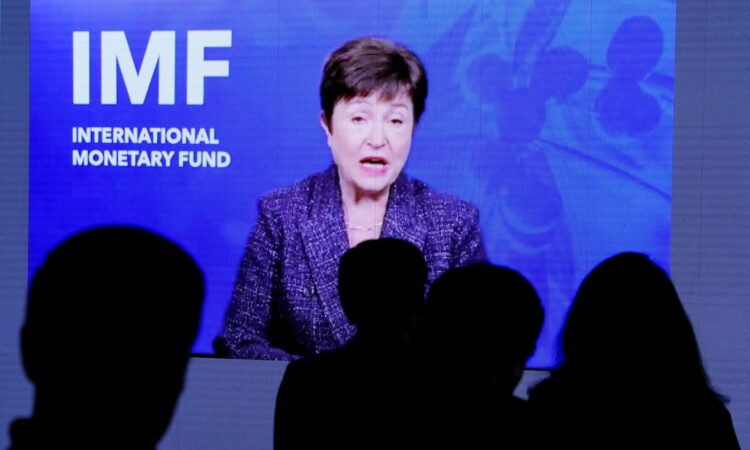
Over the next five years, global growth will hover around 3 percent, well below the 3.8 percent average of the decade before the pandemic and the most anemic outlook since 1990.
“Growth remains historically weak, now and in the medium term,” Georgieva said in a speech previewing next week’s annual meetings of the fund and the World Bank. “A robust recovery remains elusive.”
The transition from a long era of ultralow borrowing costs to today’s higher interest rates is slowing growth in advanced economies such as the United States and European Union while driving up debt costs in the developing world.
Asked about the prospect of the United States defaulting on its government debt if Congress fails to act as required later this year, Georgieva noted lawmakers always have avoided the worst outcome in such standoffs in the past. The consequences of not lifting the debt ceiling ultimately would hurt the U.S. economy through higher borrowing costs, she noted.
“They cannot default,” she said.
India and China together will account for half of global growth this year. But many emerging market economies are in worse shape because of rising debt bills and slumping demand for their exports. A potential debt crisis in the developing world, where 15 percent of low-income countries already are struggling to repay their loans, is a serious risk, Georgieva warned.
Those factors will make it harder for such countries to close the gap with wealthier nations and instead will increase the ranks of the poor and hungry, she said.
Additional worries loom, including the risk of a costly decoupling of the U.S. and Chinese economies.
“We are in a more shock-prone world,” she said.
Georgieva’s remarks came at a Washington event co-hosted by the nonprofit Meridian International Center and Politico.
The global economy in recent years has weathered a remarkable series of blows. After navigating covid-19 lockdowns and the staggered reopening of individual nations, it was hit by Russia’s invasion of Ukraine.
The resulting interruption to global food, fuel and fertilizer trade helped drive inflation to a 40-year high. As the Federal Reserve and other central banks hiked interest rates to contain rising prices, cracks appeared in the U.S. and European banking systems.
The failure of Silicon Valley Bank in the United States and the takeover of Credit Suisse by UBS in Europe illustrate the increasing complexity of the anti-inflation fight. Central banks now must balance competing objectives: keeping the lid on price pressures while maintaining financial stability, she said.
The risk of fresh problems in banks and other financial institutions remains, meaning today’s economic forecasts could prove optimistic.
“Now is not the time to be complacent,” she said.
Amid rising geopolitical tensions, the IMF fears the global economy could fragment into rival trading blocs. Financial losses in such a scenario could reach 7 percent of global gross domestic product, roughly equivalent to the combined output of Germany and Japan, Georgieva said.
A key worry is the widening split between the United States and China, the world’s two largest economies. If Washington and Beijing sever all cooperation in high-technology industries, some countries could suffer losses of up to 12 percent of their GDP, she said.
Georgieva was in Beijing late last month for talks with Chinese officials, who assured her of their desire to play a “constructive role” in reducing low-income nations’ debt burden.
The IMF and the World Bank have been struggling to head off a debt crisis in the developing world since the start of the pandemic. Poor nations borrowed heavily to cover the cost of treating covid patients even as their economies shriveled amid lockdowns.
Existing efforts to provide debt relief have made little progress amid squabbles among multilateral lenders, banks and China, an increasingly important source of financing for developing countries.
“It takes far too long for debt resolution. They have to speed up their participation,” Georgieva said of the Chinese government.






